The Role of Communication Skills for Lab Technicians
VerifiedAdded on 2023/06/12
|6
|1701
|245
Essay
AI Summary
This essay explores the significance of interactive communication skills—listening, questioning, and feedback—for lab technicians, emphasizing their role in fostering collaboration, accuracy, and overall effectiveness in laboratory settings. It argues that these skills are essential for building relationships, avoiding mistakes, and connecting with colleagues. The essay delves into the advantages of each skill, such as how listening promotes understanding and respect, questioning encourages critical thinking and clarity, and feedback enhances teamwork and productivity. It also acknowledges challenges, such as the underestimation of these skills in training and potential negative dynamics arising from power imbalances. Ultimately, the essay concludes that the application of these communication skills leads to improved outcomes for the laboratory industry and enhanced cohesion among lab technicians, supported by relevant communication theory and academic sources.
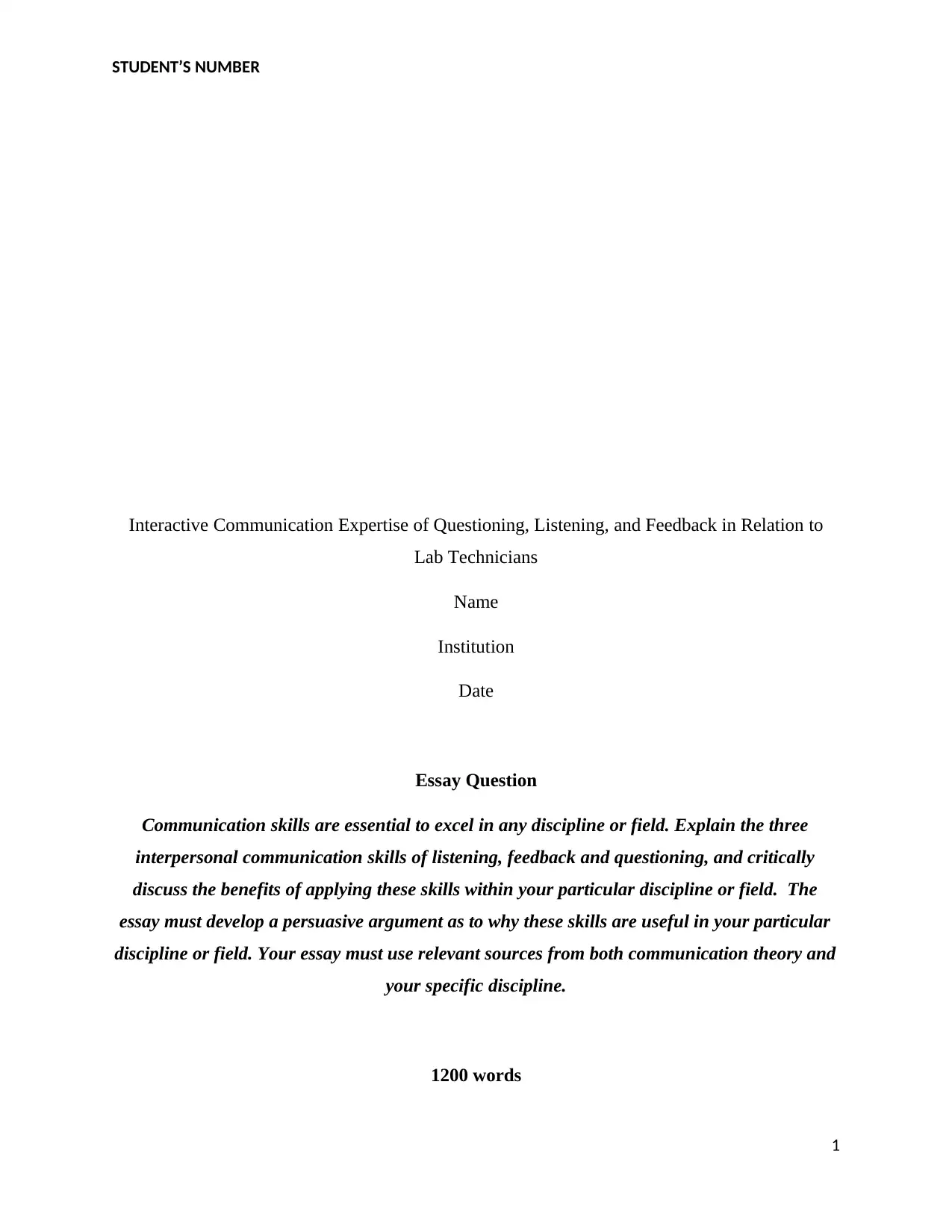
STUDENT’S NUMBER
Interactive Communication Expertise of Questioning, Listening, and Feedback in Relation to
Lab Technicians
Name
Institution
Date
Essay Question
Communication skills are essential to excel in any discipline or field. Explain the three
interpersonal communication skills of listening, feedback and questioning, and critically
discuss the benefits of applying these skills within your particular discipline or field. The
essay must develop a persuasive argument as to why these skills are useful in your particular
discipline or field. Your essay must use relevant sources from both communication theory and
your specific discipline.
1200 words
1
Interactive Communication Expertise of Questioning, Listening, and Feedback in Relation to
Lab Technicians
Name
Institution
Date
Essay Question
Communication skills are essential to excel in any discipline or field. Explain the three
interpersonal communication skills of listening, feedback and questioning, and critically
discuss the benefits of applying these skills within your particular discipline or field. The
essay must develop a persuasive argument as to why these skills are useful in your particular
discipline or field. Your essay must use relevant sources from both communication theory and
your specific discipline.
1200 words
1
Paraphrase This Document
Need a fresh take? Get an instant paraphrase of this document with our AI Paraphraser
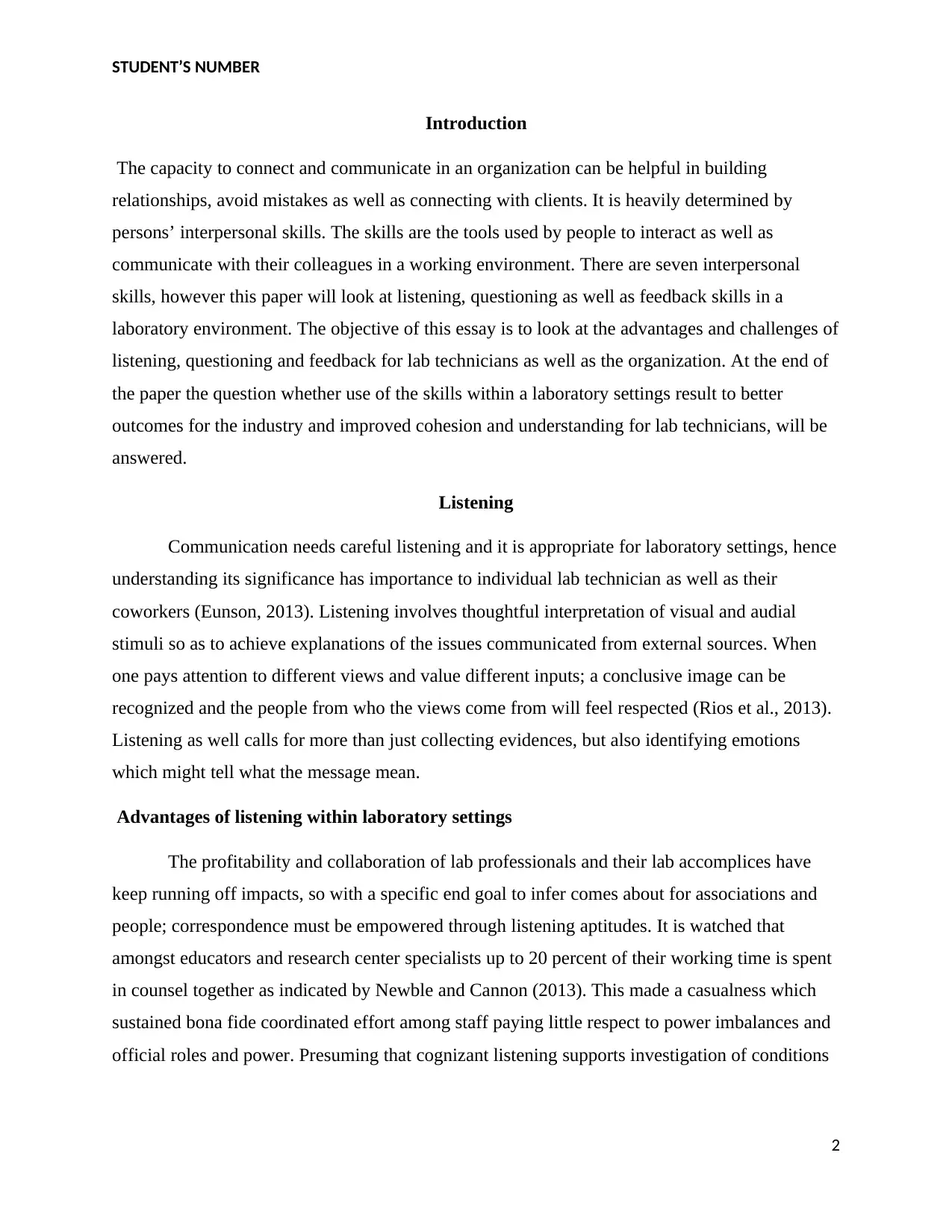
STUDENT’S NUMBER
Introduction
The capacity to connect and communicate in an organization can be helpful in building
relationships, avoid mistakes as well as connecting with clients. It is heavily determined by
persons’ interpersonal skills. The skills are the tools used by people to interact as well as
communicate with their colleagues in a working environment. There are seven interpersonal
skills, however this paper will look at listening, questioning as well as feedback skills in a
laboratory environment. The objective of this essay is to look at the advantages and challenges of
listening, questioning and feedback for lab technicians as well as the organization. At the end of
the paper the question whether use of the skills within a laboratory settings result to better
outcomes for the industry and improved cohesion and understanding for lab technicians, will be
answered.
Listening
Communication needs careful listening and it is appropriate for laboratory settings, hence
understanding its significance has importance to individual lab technician as well as their
coworkers (Eunson, 2013). Listening involves thoughtful interpretation of visual and audial
stimuli so as to achieve explanations of the issues communicated from external sources. When
one pays attention to different views and value different inputs; a conclusive image can be
recognized and the people from who the views come from will feel respected (Rios et al., 2013).
Listening as well calls for more than just collecting evidences, but also identifying emotions
which might tell what the message mean.
Advantages of listening within laboratory settings
The profitability and collaboration of lab professionals and their lab accomplices have
keep running off impacts, so with a specific end goal to infer comes about for associations and
people; correspondence must be empowered through listening aptitudes. It is watched that
amongst educators and research center specialists up to 20 percent of their working time is spent
in counsel together as indicated by Newble and Cannon (2013). This made a casualness which
sustained bona fide coordinated effort among staff paying little respect to power imbalances and
official roles and power. Presuming that cognizant listening supports investigation of conditions
2
Introduction
The capacity to connect and communicate in an organization can be helpful in building
relationships, avoid mistakes as well as connecting with clients. It is heavily determined by
persons’ interpersonal skills. The skills are the tools used by people to interact as well as
communicate with their colleagues in a working environment. There are seven interpersonal
skills, however this paper will look at listening, questioning as well as feedback skills in a
laboratory environment. The objective of this essay is to look at the advantages and challenges of
listening, questioning and feedback for lab technicians as well as the organization. At the end of
the paper the question whether use of the skills within a laboratory settings result to better
outcomes for the industry and improved cohesion and understanding for lab technicians, will be
answered.
Listening
Communication needs careful listening and it is appropriate for laboratory settings, hence
understanding its significance has importance to individual lab technician as well as their
coworkers (Eunson, 2013). Listening involves thoughtful interpretation of visual and audial
stimuli so as to achieve explanations of the issues communicated from external sources. When
one pays attention to different views and value different inputs; a conclusive image can be
recognized and the people from who the views come from will feel respected (Rios et al., 2013).
Listening as well calls for more than just collecting evidences, but also identifying emotions
which might tell what the message mean.
Advantages of listening within laboratory settings
The profitability and collaboration of lab professionals and their lab accomplices have
keep running off impacts, so with a specific end goal to infer comes about for associations and
people; correspondence must be empowered through listening aptitudes. It is watched that
amongst educators and research center specialists up to 20 percent of their working time is spent
in counsel together as indicated by Newble and Cannon (2013). This made a casualness which
sustained bona fide coordinated effort among staff paying little respect to power imbalances and
official roles and power. Presuming that cognizant listening supports investigation of conditions
2
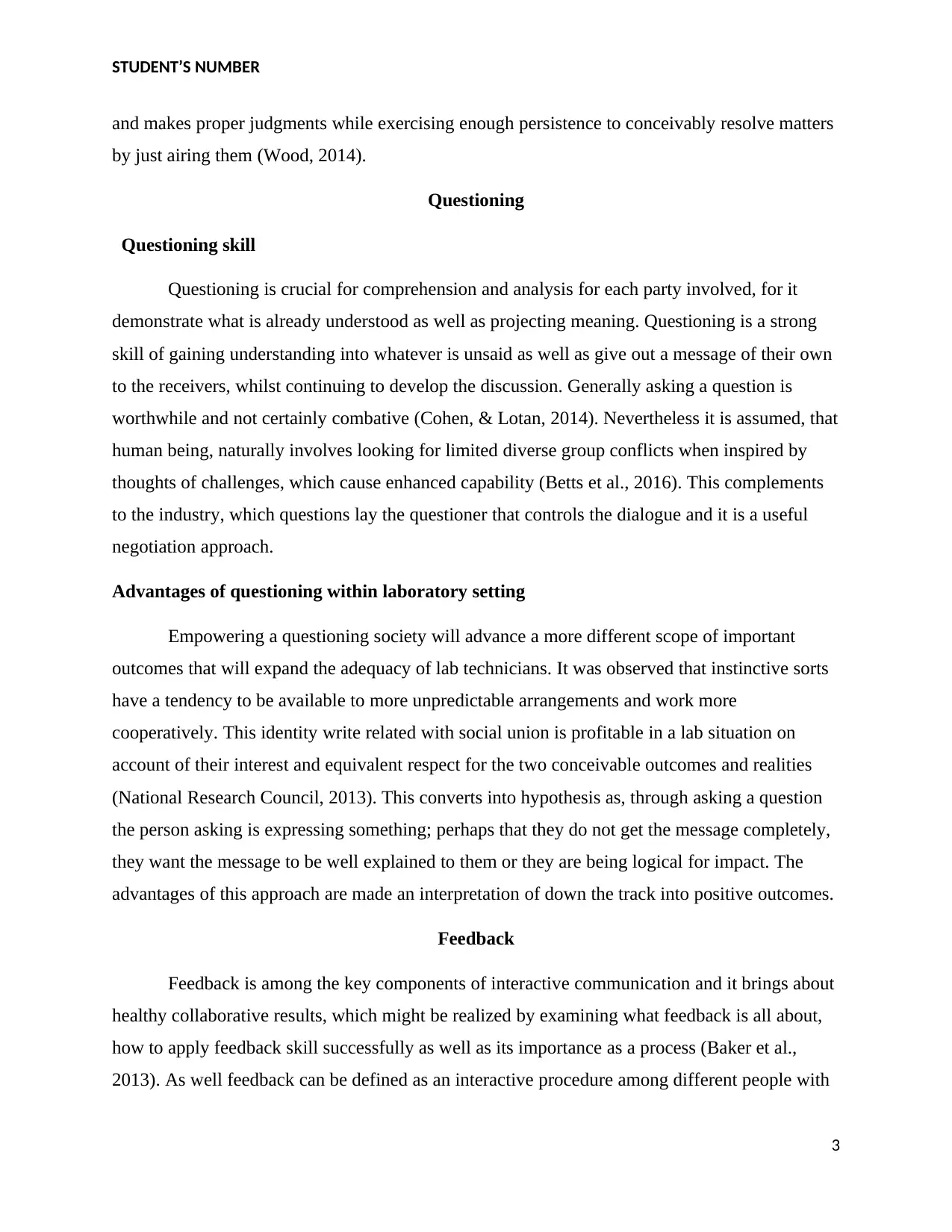
STUDENT’S NUMBER
and makes proper judgments while exercising enough persistence to conceivably resolve matters
by just airing them (Wood, 2014).
Questioning
Questioning skill
Questioning is crucial for comprehension and analysis for each party involved, for it
demonstrate what is already understood as well as projecting meaning. Questioning is a strong
skill of gaining understanding into whatever is unsaid as well as give out a message of their own
to the receivers, whilst continuing to develop the discussion. Generally asking a question is
worthwhile and not certainly combative (Cohen, & Lotan, 2014). Nevertheless it is assumed, that
human being, naturally involves looking for limited diverse group conflicts when inspired by
thoughts of challenges, which cause enhanced capability (Betts et al., 2016). This complements
to the industry, which questions lay the questioner that controls the dialogue and it is a useful
negotiation approach.
Advantages of questioning within laboratory setting
Empowering a questioning society will advance a more different scope of important
outcomes that will expand the adequacy of lab technicians. It was observed that instinctive sorts
have a tendency to be available to more unpredictable arrangements and work more
cooperatively. This identity write related with social union is profitable in a lab situation on
account of their interest and equivalent respect for the two conceivable outcomes and realities
(National Research Council, 2013). This converts into hypothesis as, through asking a question
the person asking is expressing something; perhaps that they do not get the message completely,
they want the message to be well explained to them or they are being logical for impact. The
advantages of this approach are made an interpretation of down the track into positive outcomes.
Feedback
Feedback is among the key components of interactive communication and it brings about
healthy collaborative results, which might be realized by examining what feedback is all about,
how to apply feedback skill successfully as well as its importance as a process (Baker et al.,
2013). As well feedback can be defined as an interactive procedure among different people with
3
and makes proper judgments while exercising enough persistence to conceivably resolve matters
by just airing them (Wood, 2014).
Questioning
Questioning skill
Questioning is crucial for comprehension and analysis for each party involved, for it
demonstrate what is already understood as well as projecting meaning. Questioning is a strong
skill of gaining understanding into whatever is unsaid as well as give out a message of their own
to the receivers, whilst continuing to develop the discussion. Generally asking a question is
worthwhile and not certainly combative (Cohen, & Lotan, 2014). Nevertheless it is assumed, that
human being, naturally involves looking for limited diverse group conflicts when inspired by
thoughts of challenges, which cause enhanced capability (Betts et al., 2016). This complements
to the industry, which questions lay the questioner that controls the dialogue and it is a useful
negotiation approach.
Advantages of questioning within laboratory setting
Empowering a questioning society will advance a more different scope of important
outcomes that will expand the adequacy of lab technicians. It was observed that instinctive sorts
have a tendency to be available to more unpredictable arrangements and work more
cooperatively. This identity write related with social union is profitable in a lab situation on
account of their interest and equivalent respect for the two conceivable outcomes and realities
(National Research Council, 2013). This converts into hypothesis as, through asking a question
the person asking is expressing something; perhaps that they do not get the message completely,
they want the message to be well explained to them or they are being logical for impact. The
advantages of this approach are made an interpretation of down the track into positive outcomes.
Feedback
Feedback is among the key components of interactive communication and it brings about
healthy collaborative results, which might be realized by examining what feedback is all about,
how to apply feedback skill successfully as well as its importance as a process (Baker et al.,
2013). As well feedback can be defined as an interactive procedure among different people with
3
⊘ This is a preview!⊘
Do you want full access?
Subscribe today to unlock all pages.

Trusted by 1+ million students worldwide
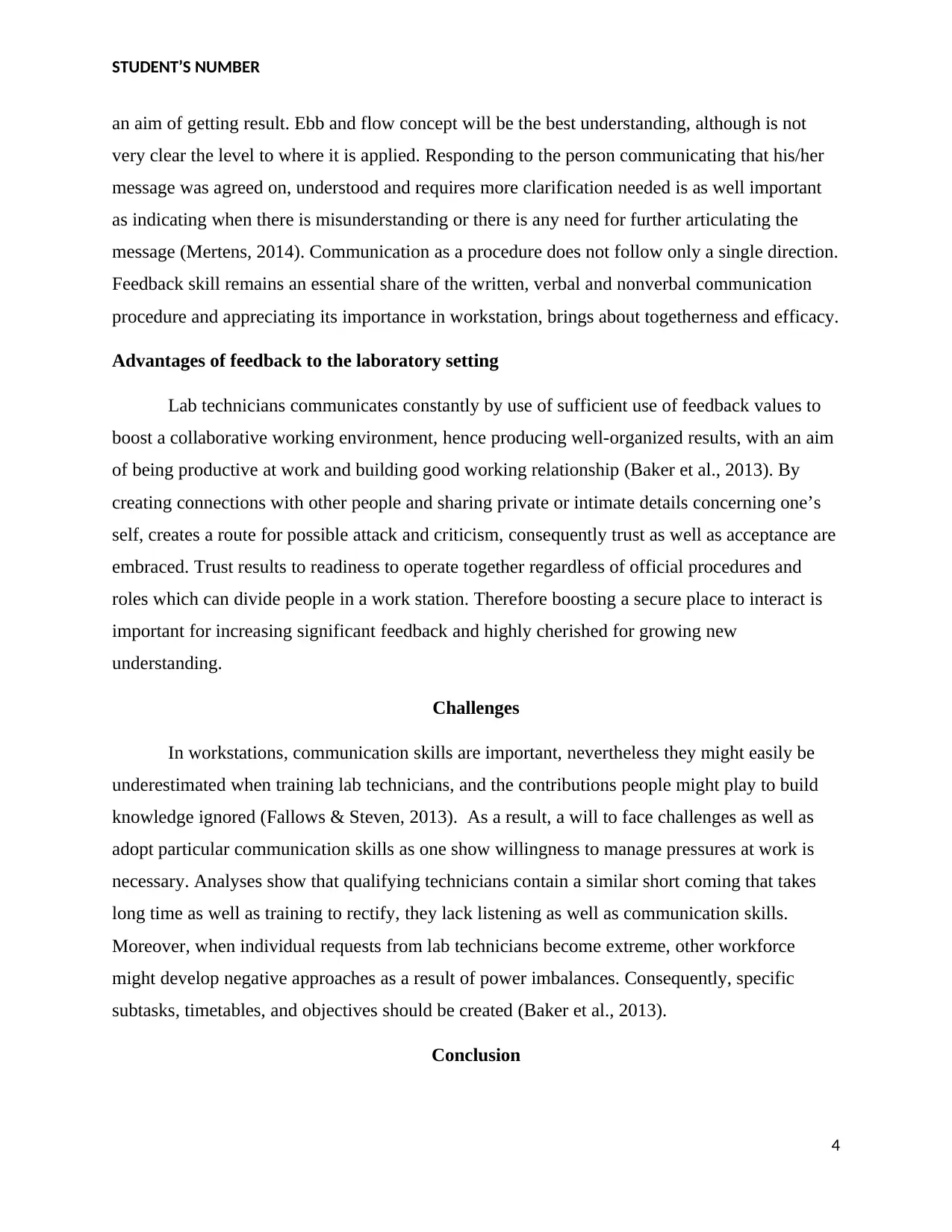
STUDENT’S NUMBER
an aim of getting result. Ebb and flow concept will be the best understanding, although is not
very clear the level to where it is applied. Responding to the person communicating that his/her
message was agreed on, understood and requires more clarification needed is as well important
as indicating when there is misunderstanding or there is any need for further articulating the
message (Mertens, 2014). Communication as a procedure does not follow only a single direction.
Feedback skill remains an essential share of the written, verbal and nonverbal communication
procedure and appreciating its importance in workstation, brings about togetherness and efficacy.
Advantages of feedback to the laboratory setting
Lab technicians communicates constantly by use of sufficient use of feedback values to
boost a collaborative working environment, hence producing well-organized results, with an aim
of being productive at work and building good working relationship (Baker et al., 2013). By
creating connections with other people and sharing private or intimate details concerning one’s
self, creates a route for possible attack and criticism, consequently trust as well as acceptance are
embraced. Trust results to readiness to operate together regardless of official procedures and
roles which can divide people in a work station. Therefore boosting a secure place to interact is
important for increasing significant feedback and highly cherished for growing new
understanding.
Challenges
In workstations, communication skills are important, nevertheless they might easily be
underestimated when training lab technicians, and the contributions people might play to build
knowledge ignored (Fallows & Steven, 2013). As a result, a will to face challenges as well as
adopt particular communication skills as one show willingness to manage pressures at work is
necessary. Analyses show that qualifying technicians contain a similar short coming that takes
long time as well as training to rectify, they lack listening as well as communication skills.
Moreover, when individual requests from lab technicians become extreme, other workforce
might develop negative approaches as a result of power imbalances. Consequently, specific
subtasks, timetables, and objectives should be created (Baker et al., 2013).
Conclusion
4
an aim of getting result. Ebb and flow concept will be the best understanding, although is not
very clear the level to where it is applied. Responding to the person communicating that his/her
message was agreed on, understood and requires more clarification needed is as well important
as indicating when there is misunderstanding or there is any need for further articulating the
message (Mertens, 2014). Communication as a procedure does not follow only a single direction.
Feedback skill remains an essential share of the written, verbal and nonverbal communication
procedure and appreciating its importance in workstation, brings about togetherness and efficacy.
Advantages of feedback to the laboratory setting
Lab technicians communicates constantly by use of sufficient use of feedback values to
boost a collaborative working environment, hence producing well-organized results, with an aim
of being productive at work and building good working relationship (Baker et al., 2013). By
creating connections with other people and sharing private or intimate details concerning one’s
self, creates a route for possible attack and criticism, consequently trust as well as acceptance are
embraced. Trust results to readiness to operate together regardless of official procedures and
roles which can divide people in a work station. Therefore boosting a secure place to interact is
important for increasing significant feedback and highly cherished for growing new
understanding.
Challenges
In workstations, communication skills are important, nevertheless they might easily be
underestimated when training lab technicians, and the contributions people might play to build
knowledge ignored (Fallows & Steven, 2013). As a result, a will to face challenges as well as
adopt particular communication skills as one show willingness to manage pressures at work is
necessary. Analyses show that qualifying technicians contain a similar short coming that takes
long time as well as training to rectify, they lack listening as well as communication skills.
Moreover, when individual requests from lab technicians become extreme, other workforce
might develop negative approaches as a result of power imbalances. Consequently, specific
subtasks, timetables, and objectives should be created (Baker et al., 2013).
Conclusion
4
Paraphrase This Document
Need a fresh take? Get an instant paraphrase of this document with our AI Paraphraser
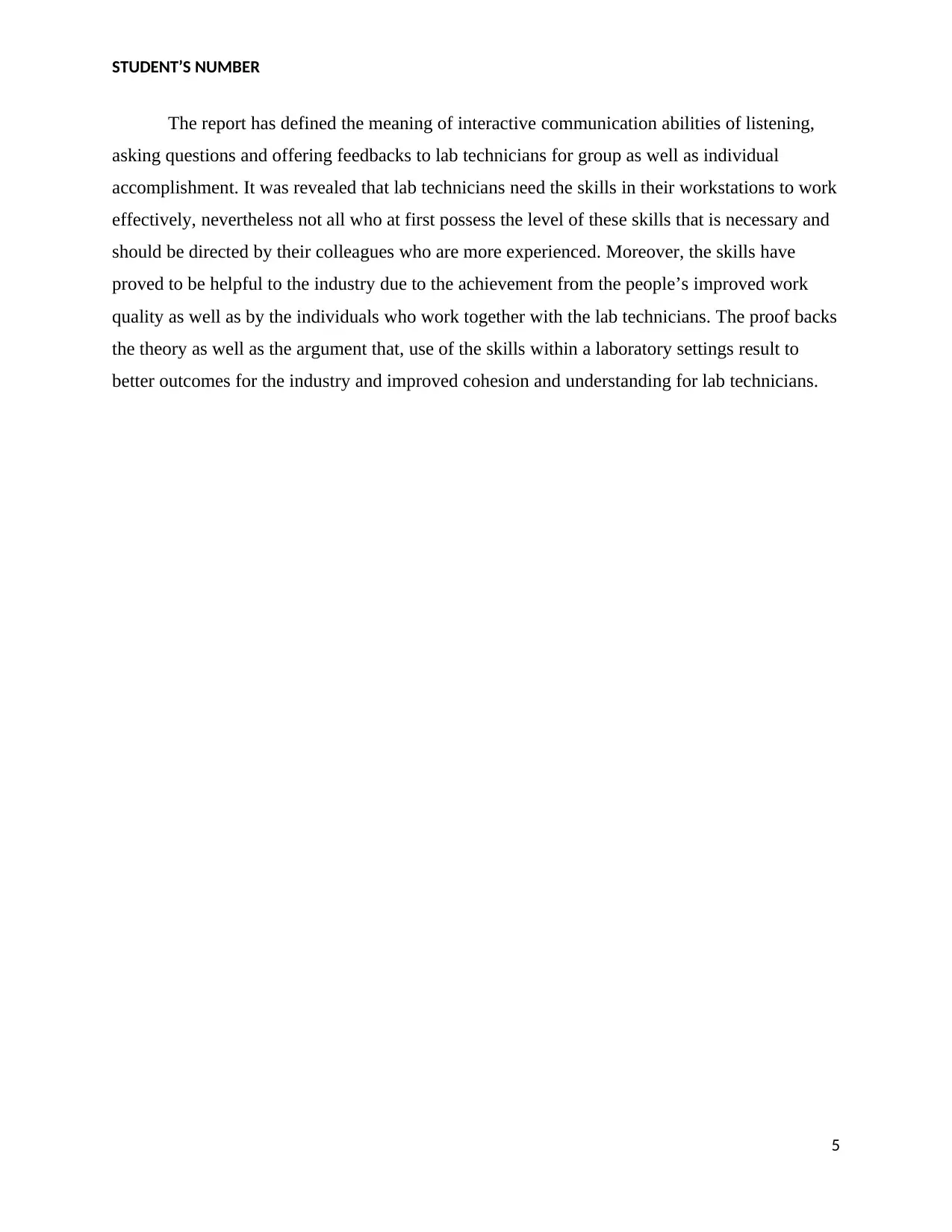
STUDENT’S NUMBER
The report has defined the meaning of interactive communication abilities of listening,
asking questions and offering feedbacks to lab technicians for group as well as individual
accomplishment. It was revealed that lab technicians need the skills in their workstations to work
effectively, nevertheless not all who at first possess the level of these skills that is necessary and
should be directed by their colleagues who are more experienced. Moreover, the skills have
proved to be helpful to the industry due to the achievement from the people’s improved work
quality as well as by the individuals who work together with the lab technicians. The proof backs
the theory as well as the argument that, use of the skills within a laboratory settings result to
better outcomes for the industry and improved cohesion and understanding for lab technicians.
5
The report has defined the meaning of interactive communication abilities of listening,
asking questions and offering feedbacks to lab technicians for group as well as individual
accomplishment. It was revealed that lab technicians need the skills in their workstations to work
effectively, nevertheless not all who at first possess the level of these skills that is necessary and
should be directed by their colleagues who are more experienced. Moreover, the skills have
proved to be helpful to the industry due to the achievement from the people’s improved work
quality as well as by the individuals who work together with the lab technicians. The proof backs
the theory as well as the argument that, use of the skills within a laboratory settings result to
better outcomes for the industry and improved cohesion and understanding for lab technicians.
5
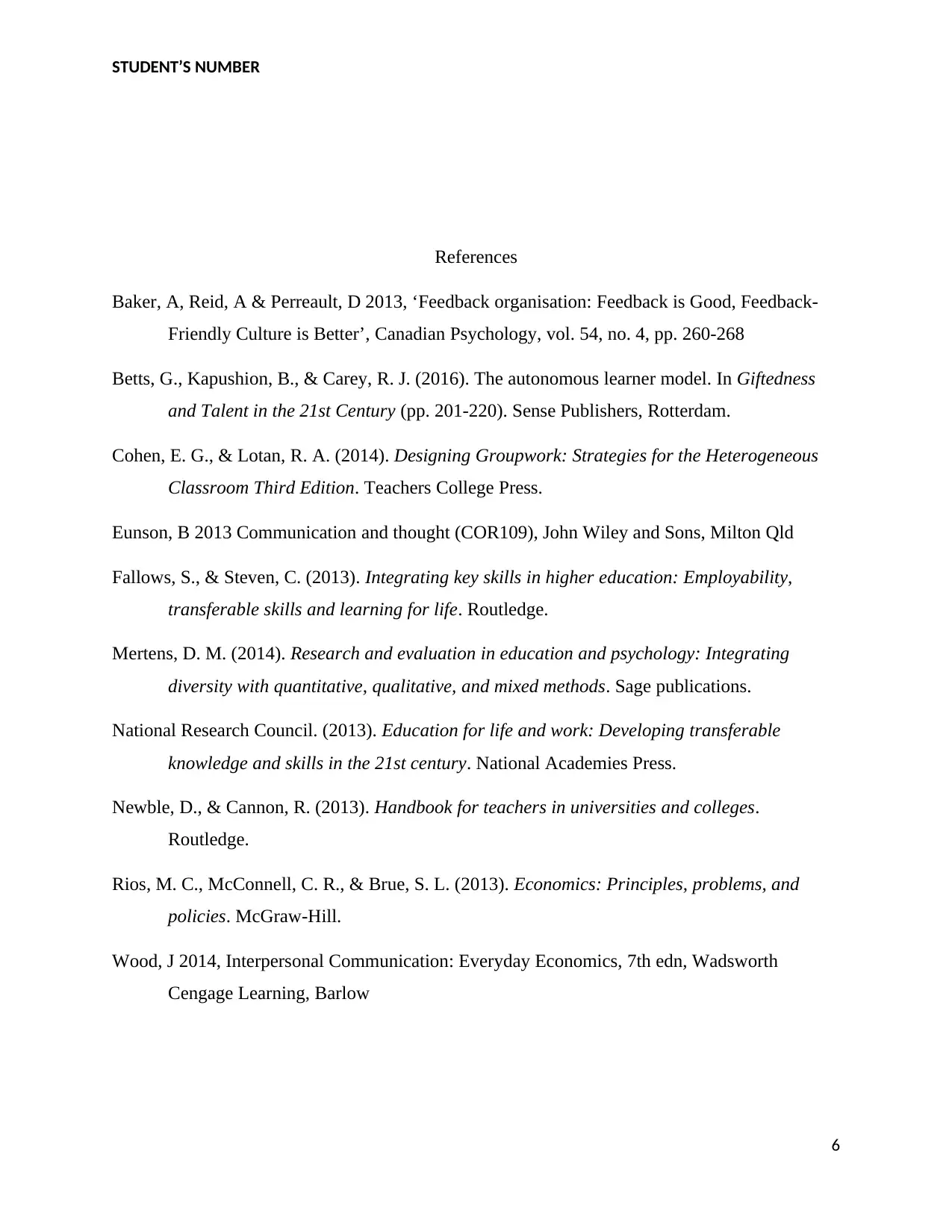
STUDENT’S NUMBER
References
Baker, A, Reid, A & Perreault, D 2013, ‘Feedback organisation: Feedback is Good, Feedback-
Friendly Culture is Better’, Canadian Psychology, vol. 54, no. 4, pp. 260-268
Betts, G., Kapushion, B., & Carey, R. J. (2016). The autonomous learner model. In Giftedness
and Talent in the 21st Century (pp. 201-220). Sense Publishers, Rotterdam.
Cohen, E. G., & Lotan, R. A. (2014). Designing Groupwork: Strategies for the Heterogeneous
Classroom Third Edition. Teachers College Press.
Eunson, B 2013 Communication and thought (COR109), John Wiley and Sons, Milton Qld
Fallows, S., & Steven, C. (2013). Integrating key skills in higher education: Employability,
transferable skills and learning for life. Routledge.
Mertens, D. M. (2014). Research and evaluation in education and psychology: Integrating
diversity with quantitative, qualitative, and mixed methods. Sage publications.
National Research Council. (2013). Education for life and work: Developing transferable
knowledge and skills in the 21st century. National Academies Press.
Newble, D., & Cannon, R. (2013). Handbook for teachers in universities and colleges.
Routledge.
Rios, M. C., McConnell, C. R., & Brue, S. L. (2013). Economics: Principles, problems, and
policies. McGraw-Hill.
Wood, J 2014, Interpersonal Communication: Everyday Economics, 7th edn, Wadsworth
Cengage Learning, Barlow
6
References
Baker, A, Reid, A & Perreault, D 2013, ‘Feedback organisation: Feedback is Good, Feedback-
Friendly Culture is Better’, Canadian Psychology, vol. 54, no. 4, pp. 260-268
Betts, G., Kapushion, B., & Carey, R. J. (2016). The autonomous learner model. In Giftedness
and Talent in the 21st Century (pp. 201-220). Sense Publishers, Rotterdam.
Cohen, E. G., & Lotan, R. A. (2014). Designing Groupwork: Strategies for the Heterogeneous
Classroom Third Edition. Teachers College Press.
Eunson, B 2013 Communication and thought (COR109), John Wiley and Sons, Milton Qld
Fallows, S., & Steven, C. (2013). Integrating key skills in higher education: Employability,
transferable skills and learning for life. Routledge.
Mertens, D. M. (2014). Research and evaluation in education and psychology: Integrating
diversity with quantitative, qualitative, and mixed methods. Sage publications.
National Research Council. (2013). Education for life and work: Developing transferable
knowledge and skills in the 21st century. National Academies Press.
Newble, D., & Cannon, R. (2013). Handbook for teachers in universities and colleges.
Routledge.
Rios, M. C., McConnell, C. R., & Brue, S. L. (2013). Economics: Principles, problems, and
policies. McGraw-Hill.
Wood, J 2014, Interpersonal Communication: Everyday Economics, 7th edn, Wadsworth
Cengage Learning, Barlow
6
⊘ This is a preview!⊘
Do you want full access?
Subscribe today to unlock all pages.

Trusted by 1+ million students worldwide
1 out of 6
Related Documents
Your All-in-One AI-Powered Toolkit for Academic Success.
+13062052269
info@desklib.com
Available 24*7 on WhatsApp / Email
![[object Object]](/_next/static/media/star-bottom.7253800d.svg)
Unlock your academic potential
Copyright © 2020–2026 A2Z Services. All Rights Reserved. Developed and managed by ZUCOL.





